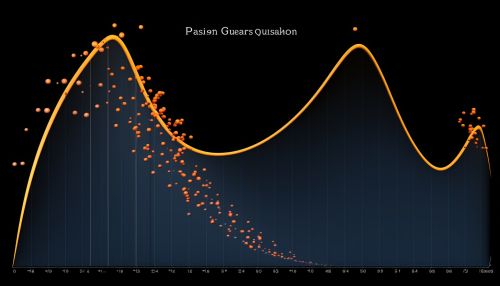Gaussian process
Introduction
A Gaussian process is a type of stochastic process that involves the collection of random variables, any finite number of which have a joint Gaussian distribution. It is a fundamental concept in the field of probability theory and statistics, and it has wide applications in fields such as machine learning, physics, quantum mechanics, and finance.


Definition
Formally, a Gaussian process is a collection of random variables, indexed by time or space, such that every finite collection of these random variables has a multivariate normal distribution. This means that any finite set of these variables has a joint Gaussian distribution. The distribution of a Gaussian process is the joint distribution of all those (infinitely many) random variables, and as such, it is a distribution over functions with a continuous domain.
Properties
Gaussian processes are characterized by their mean function and covariance function. The mean function, often denoted as m(x), is the expected value of the process at a point in its domain. The covariance function, often denoted as k(x, x'), gives the expected product of the differences of the process at two points from their respective means. These functions are often chosen to be continuous, which implies that the Gaussian process is a continuous-time process.
Applications
Gaussian processes have a wide range of applications in various fields. In machine learning, they are used for regression, classification, and optimization. In physics, they are used to model noise in electronic systems. In finance, they are used to model stock prices and other financial data. In quantum mechanics, they are used to model quantum states and processes.
Gaussian Processes in Machine Learning
In machine learning, Gaussian processes are used as a non-parametric method for performing regression and classification tasks. They provide a flexible, principled, and unified framework for representing uncertainty, handling noise, and learning from data.
Gaussian Processes in Physics
In physics, Gaussian processes are used to model noise in electronic systems. The noise in these systems is often Gaussian due to the central limit theorem, which states that the sum of a large number of independent and identically distributed random variables will have an approximately Gaussian distribution.
Gaussian Processes in Finance
In finance, Gaussian processes are used to model stock prices and other financial data. The use of Gaussian processes in finance is based on the assumption that the log-returns of stock prices are normally distributed, which is a common assumption in financial modeling.
Gaussian Processes in Quantum Mechanics
In quantum mechanics, Gaussian processes are used to model quantum states and processes. This is because the wave function of a quantum system, which describes the state of the system, is often modeled as a Gaussian process.
